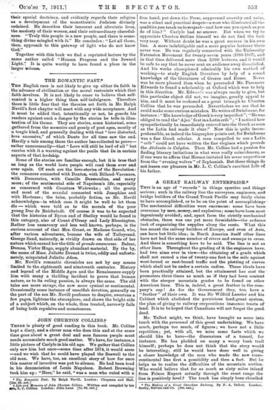JOHN CHURTON COLLINS4
THERE is plenty of good reading in this book. Mr. Collins kept a diary, and a clever man who does this and at the same time goes about a great deal and sees famous people must needs accumulate much good matter. We have, for instance, a little picture of Carlyle in his old age. We gather that Collins only saw him but once—some time after 1874, it would seem —and we wish that he could have played the Boswell to the old man. We have, too, an excellent story of how for once this master of invective was put to silence. He had been loud in his denunciation of Louis Napoleon. Robert Browning took him up : "Here," he said, " was a man who ruled with a • The Bontantio Past. By Ralph Nevill. London: Chapman and mot, [12e. 6d. net.] 1- Life and Hemoirs of John Murton Collins. Written and compiled by his ON L. C. Collins. London: John Lane. [7s. 6d. net.] firm hand, put down the Press, suppressed anarchy and noise, was a silent and practical despot—a man who illustrated all the qualities you teach rus ix: respect—and how can you speak as you do of him?" Carlyle had no answer. But when we try to appreciate Churton Collins himself we do not find the task very easy. Without doubt he was a great success in his own line. A more indefatigable and a more popular lecturer there never was. He was regularly connected with the University Extension Movement for twenty-seven years (1880-1907), and in that time delivered more than 3,000 lectures, and it woubt be safe to say that he never sent an audience away dissatisfied. And his works championed admirably his own method of- working—to study English literature by help of a sound- knowledge of the literatures of Greece and Rome. Never was he more pleased than when he persuaded Mr. Passmore Edwards to found a scholarship at Oxford which was to help in this direction. Mr. Edwards was always ready to give, but- this particular object did not, we imagine, greatly appeal to him, and it must be reckoned as a great triumph to Churton Collins that he was persuaded. Nevertheless we see that he could make some curious mistakes. He writes of Swinburne, for instance : " His knowledge of Greek is very imperfect''; "He was obliged to read the Ajax ' first in a Latin crib " ; " I noticed how. sympathetically he immediately entered into the Greek as soon. as the Latin had made it clear." Now this is quite incom- prehensible, as indeed the biographer points out, for Swinburne was a fine Greek scholar. A man compelled to use a Latin, "crib" could not have written the fine elegiacs which precede the Atalanta in Calydon. Then Mr. Collins bad a passion fin finding literary imitations in what were really coincidences, as if one were to affirm that Horace imitated his ursus vespertinur from the " evening wolves " of Zephaniah. But these things do not lessen our pleasure in Mr. L. C. Collins's excellent Life of his father.






























































 Previous page
Previous page